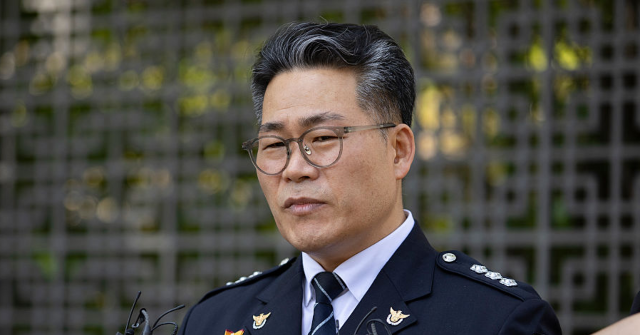South Korean police detained six Americans on Friday caught with over 1,000 bottles carrying rice, Bibles, and American money that they reportedly intended to send across the sea to North Korea.
The incident is the largest scale of its kind in years, since leftist former President Moon Jae-in began cracking down on missionary activities targeting the repressive communist state as part of its campaign to ingratiate Seoul with the rogue regime. While Moon’s successor, Yoon Suk-yeol, was a hardline conservative during his term, he did not lift many of the restrictions imposed on individuals seeking to send political leaflets, religious material, or humanitarian aid towards Pyongyang.
Yoon was recently impeached following an attempt to impose martial law in December and replaced this month by the winner of a special election, currently President Lee Jae-myung, another leftist who has promised to increase engagement attempts with the North.
According to the South’s Korea JoongAng Daily, the six Americans were found carrying over 1,300 plastic bottles filled with rice, Bibles, USB sticks featuring foreign media banned in North Korea, and American money and admitted to engaging in missionary work. Missionaries often use plastic bottles in this manner as they float and easily travel across the sea via currents into rural, impoverished areas of the North.
Authorities did not name the individuals in question, identifying them only as men “in their 20s to 50s” who had entered the country two to three months ago with American passports and did not speak fluent Korean. Authorities stated that they did not have and would not pursue an arrest warrant for the men, according to the South Korean news agency Yonhap, as the activities the men were engaging in did not rise to the level of public security threats meriting an arrest. South Korean maintains exceptionally positive relations with the United States and, following an especially volatile six months in which five presidents took helm of the country, its government is likely to consider aggressive law enforcement action against American missionaries needlessly aggravating of a delicate situation.
“We’re going to release them as we believe the situation does not call for requesting an arrest warrant, and we plan to continue investigating them without physical detention,” Yonhap quoted an unnamed police official as saying.
Their activities took place on an island in Incheon which the South Korean government had designated a restricted area. South Korean authorities have limited such activities in the past throughout the country due to the possibility of creating national security risks and designated Ganghwa County, Incheon, as an especially “high-risk” area for similar ocean launches in November.
According to JoongAng, while the individuals in question will not be arrested, police are planning to charge them for violating laws against “potentially destabilizing activities in designated restricted zones.”
Prior to falling under communism in the mid-20th century, North Korea was home to one of the largest Christian populations on Earth and its capital, Pyongyang, was known as the “Jerusalem of the East.” Following the founding of communist North Korea by Kim Il-sung, grandfather of current dictator Kim Jong-un, Christianity was swiftly outlawed and citizens were forced to worship the Kim family as gods. To this day, owning or being caught within the vicinity of a copy of the Bible is illegal; Christians are regularly executed for their faith and families forced into labor camps for generations as punishment for believing in Jesus.
Despite this, the faith persists in secret in the country — and defectors who have escaped the country, many of them Christians, have for years attempted to help Christians continue to worship under the brutal Kim regime.
American and Korean-American activists have long also played a role in this community, helping efforts to spread Christianity and share critical humanitarian aid with the starving populace. Among the most famous cases of American Christian missionaries imprisoned for their work is that of Kenneth Bae, who was held hostage for over 700 days and tortured by the North Korean regime for spreading the faith in the country. He was sentenced to 15 years in prison in 2013 but released as part of negotiations with the United States a year later.
Less direct attempts to engage in military work within North Korea have for years featured attempts to float humanitarian aid and Christian materials into the country via sea. In 2018, Kim Yong Hwa, the head of the North Korea Refugees Human Rights Association of Korea, described overseeing dozens of rice bottle operations and estimating that they had successfully dispatched 60 tons of rice to the victims of Pyongyang. Similar groups sending rice dispatches in 2021 described the practice of “holy rice,” saving servings of rice from their dinner to share with the poor, as informing the practice.
President Moon, who visited North Korea on multiple occasions and advocated for friendship with the repressive communists, implemented policies to curtail missionary and humanitarian activity aiding North Koreans in response to the regime’s aggressive condemnation of these acts. In 2020, the South Korean government prevented Voice of the Martyrs Korea, an advocacy group, from floating an estimated 500 bottles into South Korea carrying Bibles and rice, outraging international human rights advocates.
Yoon did not lift the Moon-era restrictions, but activists managed to flaunt the policies with minimal pushback from the South Korean government in 2023, organizing a Christmas bottle launch featuring USB flash drives full of Christmas content and Biblical content to the North.
On Friday, Yonhap reported that current President Lee has already begun implementing measures to block leaflet drops to North Korea. Lee took office on June 4, vowing after his inauguration to pursue dialogue with North Korea.
“We will open channels of communication and pursue dialogue and cooperation with the North to build lasting peace on the Korean Peninsula,” he promised.
Follow Frances Martel on Facebook and Twitter.
Read the full article here
